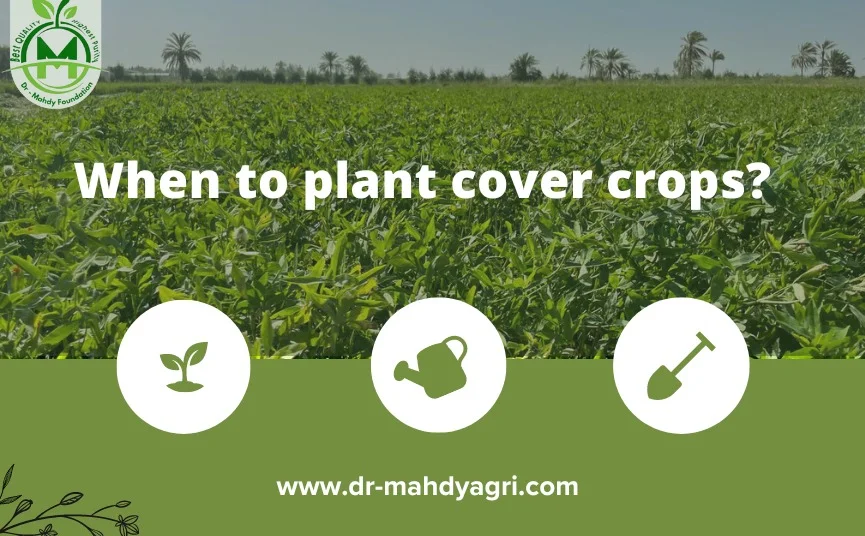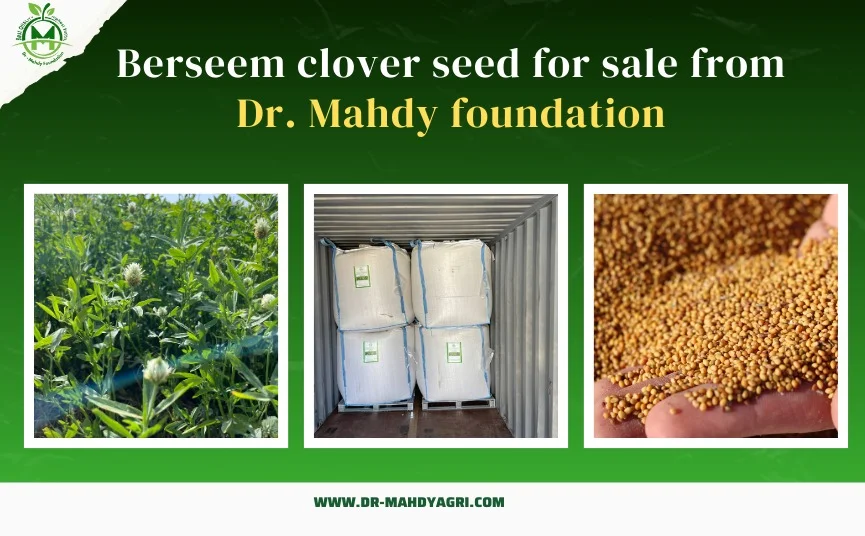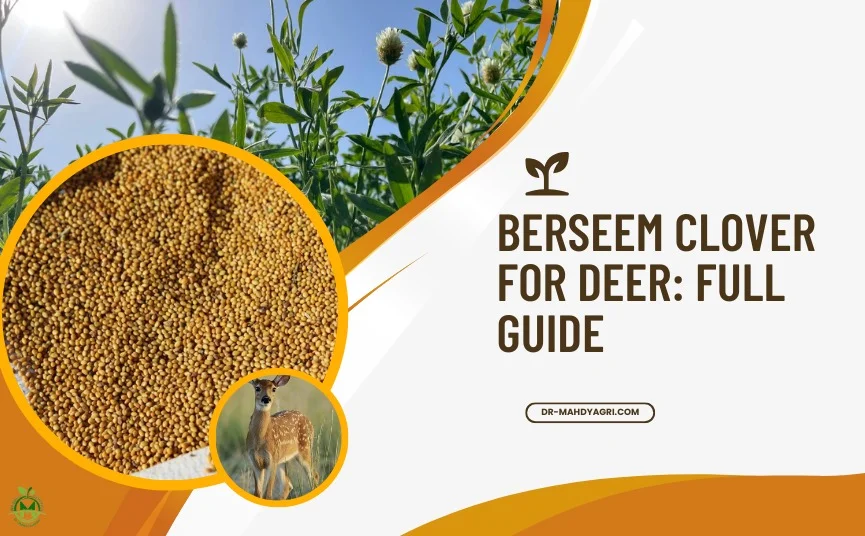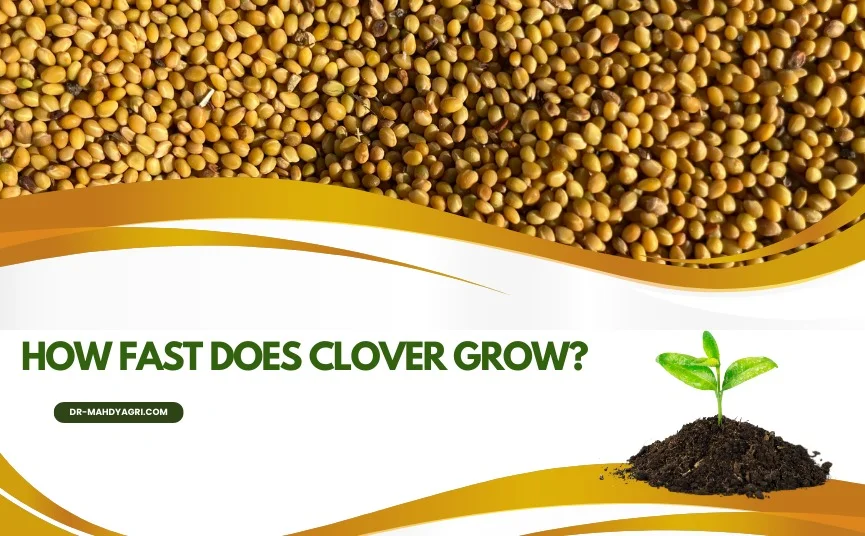

Berseem clover, also known as Egyptian clover (Trifolium alexandrinum), is a valuable forage crop for cattle. Here are some key points about berseem clover and its benefits for cattle with dr mahdy foundation.
This blog post delves into the benefits of adding berseem clover as cover crop to your cattle's diet, including its ability to increase weight gain, improve milk production, lower feed costs, and promote sustainable agriculture.
What is Berseem Clover and its Benefits for Cattle
Berseem Clover is a legume crop that belongs to the Trifolium family and is grown primarily for forage. It is highly valued for its nutritional benefits and as a feed supplement for cattle.
This clover species is native to the Mediterranean region but is now cultivated worldwide due to its adaptability and forage quality.
Berseem Clover has a high protein content, making it an excellent source of nutrients for cattle. It contains essential amino acids that aid in muscle development and overall growth.
In addition to protein, this clover species also provides other essential nutrients such as fiber, vitamins, and minerals, which contribute to the overall health and productivity of cattle.
Berseem Clover is known to improve digestibility and promote better feed conversion efficiency in cattle.
Through its nitrogen-fixing capabilities, this legume crop improves soil fertility and reduces the need for synthetic fertilizers.
Berseem Clover is a versatile forage crop that can be grown in various climates and soil types, making it a reliable option for cattle farmers.
Overall, incorporating Berseem Clover in cattle farming practices can result in improved animal health, increased milk or meat production, and reduced feed costs.
Berseem Clover overview
Berseem Clover is a versatile legume crop that is highly valued for its nutritional benefits and use as a feed supplement for cattle. It belongs to the Trifolium family and is native to the Mediterranean region. Berseem Clover is cultivated worldwide due to its adaptability and high forage quality. It is known for its high protein content, essential amino acids, fiber, vitamins, and minerals, all of which contribute to the overall health and productivity of cattle. This legume crop also improves soil fertility through nitrogen fixation and can be grown in various climates and soil types.
Nutritional benefits for cattle
Berseem Clover offers numerous nutritional benefits for cattle. It is rich in protein, essential amino acids, fiber, vitamins, and minerals, making it an excellent feed supplement. The high protein content in Berseem Clover helps support muscle development and growth in cattle. The essential amino acids are essential for various metabolic processes in the body. The fiber content aids in proper digestion and improves gut health. Additionally, the vitamins and minerals in Berseem Clover contribute to overall health and productivity in cattle.
Read More about Berseem Clover Balady and how use Berseem clover for deer
Growing Berseem Clover
Berseem Clover is a versatile and fast-growing forage crop that can thrive in a variety of climates and soil types. It is typically grown as an annual, reaching a height of 2-3 feet. Berseem Clover is known for its ability to fix nitrogen in the soil, which makes it an excellent choice for improving soil fertility. It has a high tolerance for wet and cold conditions, making it suitable for cultivation in areas where other forage crops may struggle. Berseem Clover can be sown in early spring or late summer, depending on the desired harvest date. It is typically harvested at early bloom or before it sets seed to ensure high nutritional value.
Ideal conditions for cultivating Berseem Clover
Berseem Clover thrives in cool-season regions with temperatures between 60-80 degrees Fahrenheit. It prefers a pH level of 6-7.5 and well-drained soil with high fertility. It requires a minimum of 20 inches of rainfall per year or consistent irrigation. Full sun exposure is ideal for optimal growth. It is recommended to plant Berseem Clover in early spring or late summer to avoid extreme temperatures. It should be planted in a firm and clean seedbed at a depth of ¼ - ½ inch. When sowing, it is advised to inoculate the seeds with rhizobium bacteria to enhance nitrogen fixation. Regular soil testing and proper nutrient management are essential for successful cultivation of Berseem Clover.
Harvesting and storage techniques
When it comes to harvesting Berseem Clover, it is essential to cut the plants at the early flowering stage to maximize its nutritional value for cattle.
The cut plants should be spread out in a thin layer and dried in the sun until the moisture content reaches around 15%.
After drying, the plants can be baled or stacked for storage.
It is important to store Berseem Clover in a dry and well-ventilated area to prevent mold or moisture damage.
Properly dried and stored Berseem Clover can be used as a nutritious feed supplement for cattle throughout the year.
Read More:
berseem clover seed for sale
berseem clover vs balansa clover
berseem clover annual or perennial
Berseem Clover as a Feed Supplement
Berseem Clover is an excellent feed supplement for cattle due to its high protein content and nutritional benefits.
It provides a rich source of essential amino acids, vitamins, and minerals that support the growth and development of cattle.
As a protein-rich feed, Berseem Clover can help improve milk production and enhance the overall health and condition of the animals.
Cattle fed with Berseem Clover as a supplement have shown increased weight gain and improved fertility.
Including Berseem Clover in the feeding program can help meet the nutritional requirements of cattle and enhance their performance.
Berseem Clover as a protein-rich feed supplement
Berseem Clover is highly regarded as a protein-rich feed supplement for cattle. It provides an abundance of essential amino acids, which are crucial for the growth and development of the animals. This protein content plays a vital role in enhancing milk production and improving the overall health and condition of the cattle. When included in the feeding program, Berseem Clover has shown to increase weight gain in cattle and improve fertility. The nutritional benefits of Berseem Clover make it an excellent choice for supplementing the diet of cattle.
Health benefits for cattle
Berseem Clover provides numerous health benefits for cattle. The high protein content supports muscle development and enhances overall body condition. This can lead to improved fertility and increased milk production. Berseem Clover is also rich in essential amino acids, promoting healthy growth and development. Additionally, the consumption of Berseem Clover can help improve digestion and nutrient absorption in cattle. Overall, including Berseem Clover in the feeding program can greatly contribute to the overall health and well-being of the cattle.
Read More:
Berseem Clover Forage
berseem clover seed non gmo
berseem clover scientific name
Berseem Clover in Cattle Farming Practices
Incorporating Berseem Clover in feeding programs can greatly benefit cattle farming practices.
Manage grazing of Berseem Clover carefully to ensure proper utilization without overgrazing.
Berseem Clover can be used as a standalone forage or mixed with other feeds to provide a balanced diet for cattle.
Begin introducing Berseem Clover gradually into the feeding program to allow the cattle's digestive system to adjust.
Monitoring the cattle's health closely after introducing Berseem Clover can help identify any potential issues and make adjustments if necessary.
Consult with a veterinarian or nutritionist to develop an optimal feeding plan that incorporates Berseem Clover.
Incorporating Berseem Clover in feeding programs
Careful management of grazing is essential to ensure proper utilization of Berseem Clover in feeding programs for cattle.
When incorporating Berseem Clover, it can be used as a standalone forage or combined with other feeds to provide a well-balanced diet.
It is important to gradually introduce Berseem Clover into the feeding program to allow the cattle's digestive system to adjust.
Close monitoring of the cattle's health after introducing Berseem Clover is crucial to identify any potential issues and make adjustments if needed.
Consulting with a veterinarian or nutritionist can help develop an optimal feeding plan that incorporates Berseem Clover effectively.
Read More: how fast does clover grow?
Managing grazing of Berseem Clover
Proper management of grazing is crucial when it comes to Berseem Clover in cattle farming.
Cattle should have access to the forage when it reaches a height of about 6-8 inches.
Rotational grazing is recommended to prevent overgrazing and allow the plants to regrow.
Cattle should be moved to a different section once they have grazed down to about 2-3 inches.
Allowing the plants enough time to regrow before grazing again is essential.
Regular monitoring of grazing patterns and adjusting stocking rates is necessary to ensure optimal utilization of Berseem Clover.
Potential Challenges of Using Berseem Clover
Common issues when utilizing Berseem Clover include the risk of bloat in cattle due to its high protein content and digestibility. Another challenge is the need for proper moisture management, as excessive rainfall or irrigation can lead to waterlogging and crop damage. Additionally, Berseem Clover may be susceptible to diseases and pests, such as powdery mildew or aphids. Mitigation strategies for these challenges include providing bloat-prevention measures, implementing drainage systems, and using appropriate pest control methods. Overall, careful management and monitoring are essential to overcome these potential challenges and maximize the benefits of using Berseem Clover in cattle farming.
Common issues when utilizing Berseem Clover
Berseem Clover can present some common challenges when it comes to utilization in cattle farming. One of these challenges is the risk of bloat in cattle. This is due to the high protein content and digestibility of Berseem Clover, which can lead to fermentation and gas production in the rumen. Another challenge is the need for proper moisture management. Excessive rainfall or irrigation can result in waterlogging, which can damage the crop. Additionally, Berseem Clover is susceptible to diseases and pests such as powdery mildew and aphids, which can impact its growth and quality. It is important to address these challenges to maximize the benefits of Berseem Clover in cattle farming.
Mitigation strategies
To mitigate the common challenges when utilizing Berseem Clover in cattle farming, there are several strategies that can be implemented.
- Bloat prevention: Introduce Berseem Clover gradually to allow cattle's rumen to adapt to the high protein content.
- Supplement with dry forage: Provide cattle with dry hay or straw before grazing on Berseem Clover to reduce the risk of bloat.
- Proper moisture management: Monitor and control irrigation and rainfall to prevent waterlogging, which can damage the crop.
- Disease and pest control: Implement integrated pest management techniques to minimize the impact of diseases and pests on Berseem Clover growth.
- Regular monitoring and management: Monitor the growth of Berseem Clover and address any issues promptly, such as nutrient deficiencies or weed competition.
By implementing these mitigation strategies, cattle farmers can minimize the risks associated with utilizing Berseem Clover and maximize its benefits in their farming practices.
Conclusion
The utilization of Berseem Clover in cattle farming holds significant advantages for farmers. Its high protein content and nutritional benefits make it an excellent feed supplement for cattle. By incorporating Berseem Clover into their feeding programs and managing grazing effectively, farmers can enhance the health and productivity of their cattle. Although there may be challenges associated with using Berseem Clover, such as bloat and disease risks, these can be mitigated through proper implementation of strategies. Overall, Berseem Clover offers a valuable and sustainable option for cattle farmers looking to improve their farming practices. you can call with Dr. Mahdy Best seller of Egyptian Berseem Clover seeds for cover crops.



